Co-operation
International Conference : Languages of the Wider World-Understanding Resilience and Shift in Regional & Minority Languages
06-08 April 2011, Leeuwarden / Netherlands
This second international conference organised jointly by the Mercator European Research Centre on Multilingualism and Language Learning of the Fryske Akademy (The Netherlands) and the SOAS-UCL Centre for Excellence in Teaching and Learning „Languages of the Wider World“ (LWW CETL) (UK) took place from 6-8 April 2011 in the charming city of Leeuwarden, the capital of the bilingual province Fryslân (Netherlands).
Using mother tongue and learning a second and third language is a formal right for all people, a right which often is absent and its use in practice is often less well guaranteed and less developed than should be the case, especially for speakers of smaller or lesser used languages variously labelled as „regional“, „minority“, „community“, „heritage“ languages, etc. The conference focused on theoretical and empirical work in research, teaching and learning of such languages worldwide.
This conference brought together researchers and practitioners from these various fields to define, analyse and explore new directions and paradigms in understanding resilience and shift of regional and minority languages (see conference-programme).
The Macedonarmân Council accredited three representatives to participate at this Conference with the theme “Bilingualism, a new stage in the construction of the European identity – the case of Macedonarmâns„, presented by Nicolas Caracota, general secretary of Macedonarmân Council.
Bilingualism is not only a sign of cultural wealth, which obviously should not be lost, but rather a sign and a means of rapprochement between two communities and the expression of tolerance, crucial in a common building. The present national identities, especially those that focuses exclusively on the side „uniform“ , neglecting or even worse, annihilating their constituent components, cannot lead to the construction of a new European identity. One inevitable way to allow that new construction is to abandon the concept of „national minority“, as he is perceived and used in Europe in general and especially in Eastern Europe and Southeast.
The concept of „minority national“ should be replaced by the concept of “regional people or community“, should no longer be subscribed to an European nation state, as they were created in the last two centuries. In most of these „regional communities or peoples“ language often (but not always) identical to that of another nation-state was a constituent part of a national state of another language. Policy „national uniform“ of the new states created after the French Revolution of 1789, beginning late 20th century, mostly led to tensions between communities in Europe and obviously the bloody wars. Source voltage is often mistrust between communities and their leaders wish to be „large“ and „strong“ distrust which often translates into different identity tend to cancel others. New Europe under construction, looking for new solutions to achieve unity in diversity.
The easiest solution is to encourage bilingualism in all areas where two cultures live together, as the only way to build a new identity which will be based on a dual cultural identity, diversity and mutual knowledge accepted.
Abstracts of all presentations could be seen here.
International Conference : „Partnership for Diversity“ – The Role of cultural and linguistic rights in bilding a European society
27 November 2010, Lorient ( Brittany ) / France
After Doublin in 2000 and then Helsinki, Palma de Mallorca, Gorizia, Isle of Skye, Vigo di Fassa, Gdansk and Ljouwert / Leeuwarden, the ninth conference „Partnership for Diversity“ was held in Lorient (Brittany) / France, on 27 th of November, at the same date as the song contestin minority languages organized by Liet Internationalk and the Interceltic Festival of Lorient with the support of the Council of Europe and the Regional Council of Brittany.
The Conference, organized jointly by the Kevre Breizh ( Cultural Coordination of Brittany ) abd EBLUL, continued to compare experiences and to look for ways to preserve and promote languages and cultural diversity all over Europe. The conference brought together experts, representatives of local and regional elected bodies, and non-elected activists who are working daily in the field of minority languages and cultural expression.
The conference enabled to the participants to compare the fundamental principles of diversity and tolerance to the reality and to the actions carried out in the different States of the Union, both by the authorities as well as within society itself and to discuss what part the European Union can play.
Council of Macedonarmâns accredited four persons to take part at this ninth Conference „Partnership for Diversity“.
International Seminar : Images of Minority Languages
01 June 2010, Brussels / Belgium
This international Seminar was organized by the Swedish Cultural Foundation in Finland, within the framework of the European Foundation Centre´s ( EFC ) Foundation Week. The Seminar has introduced European policy makers, foundation colleagues and other prominent guests to the world and reality of the many linguistic minorities in Europe.
Creating an image of a particular minority language is not only about constructing a brand. It is also about explaining the role of the minority in society and underlining the importance of understanding culture and languages in general. The image of a language affects the majority´s interest in and knowledge of the minority.
The event was hosted by Member of European Parliament Mr. Carl Hagland, Co-Chair of the Intergroup for Traditional Minorities, National Communities and Languages. A number of distinguished speakers presented best practise cases of how the image of their minority language has been enhanced. The Seminar had a look beyond the general facts about linguistic minorities and focused on how a positive image of a language is formed.
The Macedonarmân Council accredited two representatives to participate at this Seminar, with the theme „Bilingualism and double ethnic identity„.
International Conference : Multilingualism, Regional & Minority Languages
16-17 April 2009, University of London
This international conference was organised jointly by the SOAS-UCL Centre for Excellence in Teaching and Learning Languages of the Wider World (LWW CETL) (UK, www.lww-cetl.ac.uk) and the Mercator European Research Centre on Multilingualism and Language Learning of the Fryske Akademy (The Netherlands, www.mercator-research.eu).
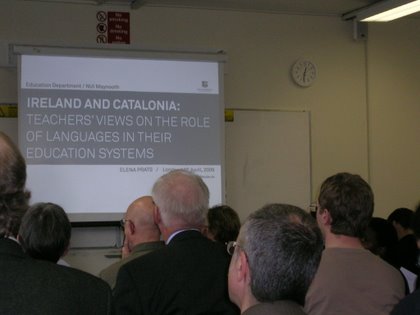 All people have the right to learn and use their mother-tongue, and to learn a second and third language.
All people have the right to learn and use their mother-tongue, and to learn a second and third language.
This formal right is often absent and its use in practice is often less well guaranteed and less developed than should be the case, especially for speakers of smaller languages variously labelled as „regional“, „minority“, „immigrant“, „community“ (including sign languages), „heritage“ languages, etc.
The conference focused on theoretical and empirical work in research and implementation of teaching and learning models and strategies for language learning.
The conference combined the fields of interest of the partner institutions. The LWW CETL focuses on languages of Asia, the Middle East, Africa, Eastern Europe, Scandinavia and the Netherlands. The focus of MERCATOR and the Fryske Akademy is on language learning and language transmission of Regional and Minority Languages and smaller state languages in Europe.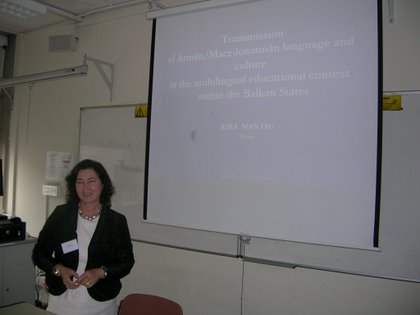
This conference brought together researchers and practitioners from these various fields to define, analyse and explore new directions and paradigms for „Languages of the Wider World“. It also provided opportunities for further research and future collaborations.
The parallel sessions covered four broad themes: Language Transmission, Education Issues, New Technologies, and Social Benefits and Costs.
The Macedonarmân Council accredited two representatives to participate at this Conference with the theme “Transmission of Arman / Macedonarmân language and culture in the multilingual educational context within Balkan States”.
Seminar on Cross-border Cooperation of the Armâns(Macedonarmâns)
Disentis, Switzerland, 25 -28 October 2007
In many aspects the Macedonarmân people is a special „European“ problem in the field of minority issues. They are endangered by extinction, their political and judicial status differs from one state to the other.
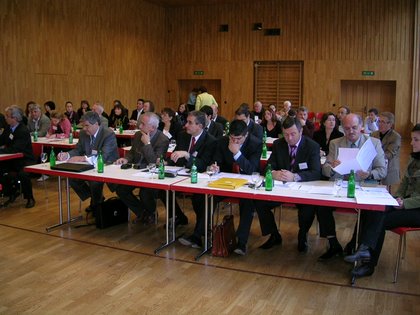 The traditional Macedonarmân life style was completely disrupted at the beginning of the last century by the political and social changes in the Balkans. When their territory was divided up among four different sites and the borders were made permanent, the different Arman(Macedonarmân) communities found themselves unable to conduct their traditional exchanges. More often than not, their herds and lands were sold, and many Armâns left their traditional mountainsides to settle in the towns and thus merge with the masses. As a result, the Macedonarmân language and culture, which had survived for 2000 years in the Balkan mountains, are today threatened with extinction.
The traditional Macedonarmân life style was completely disrupted at the beginning of the last century by the political and social changes in the Balkans. When their territory was divided up among four different sites and the borders were made permanent, the different Arman(Macedonarmân) communities found themselves unable to conduct their traditional exchanges. More often than not, their herds and lands were sold, and many Armâns left their traditional mountainsides to settle in the towns and thus merge with the masses. As a result, the Macedonarmân language and culture, which had survived for 2000 years in the Balkan mountains, are today threatened with extinction.
In 1997, the Council of Europe passed a recommendation in which the cultural demands are formulated to prevent total extinction.
The Armâns want to be recognised as a national minority and they want support by the states in the following fields: mother tongue teaching, religious services, newspaper, magazines, radio and TV programmes as well as support for their cultural associations.
Due to different reasons, unfortunately the recommendation(Recommendation 1333/1997) has not so far brought significant results.
One of the problems is the fact that the single associations aren’t able to cover the fundamental needs in the various fields of the language and culture. A precondition for protecting and preserving the Arman language and culture would therefore lie in a minimal coordination of the associations and the state bodies of the Balkan states concerned.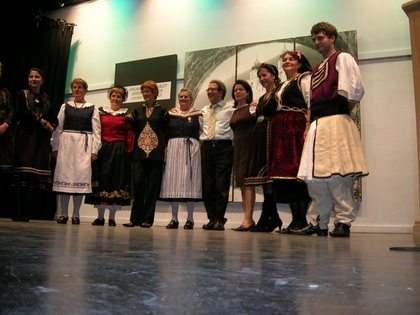
This Seminar was organized by Convivenza(Internationales Zentrum für Minderheiten) in collaboration with FUEN ( Federal Union of European Nationalities ).
The aim of the project was to bring the most important Armân associations and the state bodies concerned together and to initiate and to strengthen a cross-border cooperation between the Balkan States as a condition for the efficient promotion of the Armân(Macedonarmân) language and culture.
The first step was to obtain an extensive analysis of the situation, the Macedonarmân language and culture and the political and cultural status of the Arman in the states concerned.
What is the real situation, what exists already, which are the good practices, where the differences ?
Which fields of activity are fundamentally needed for preserving the Armân Language and culture?
How could the states concerned together with the Armân associations coordinate their work, profiting from of the synergies by avoiding duplicated work?
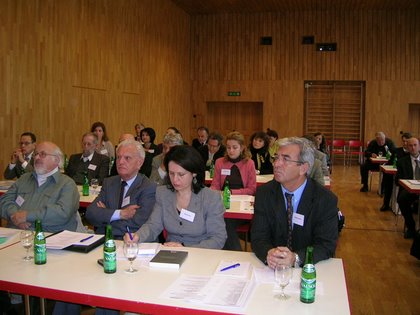 By a repartition of the different fields of activities in the different areas it should be possible to avoid the „amateurism“ in favour of professional work regarding the training of teachers, the production of textbooks, the language studies, the history etc.
By a repartition of the different fields of activities in the different areas it should be possible to avoid the „amateurism“ in favour of professional work regarding the training of teachers, the production of textbooks, the language studies, the history etc.
The aim of the seminar was also to reach a consensus about the creation of a cross-border Armân(Macedonarmân) Council.
A preparatory group has been elected to concretize the project and prepare the seminar in 2008 or 2009 when the Council should officially be installed.
The composition of the preparatory group will include representatives of the Balkan States concerned, representatives of the most important Armân Associations; FUEN / Convivenza will offer the assistance as a neutral partner (presentation, fundraising).
A common cross-border project giving the prestige of a „European dimension“,
is urgently necessary to ensure the survival of this over 2000 years language and culture in the region and to guarantee the professional work in the vital sectors of the language and the culture, especially in the field of education.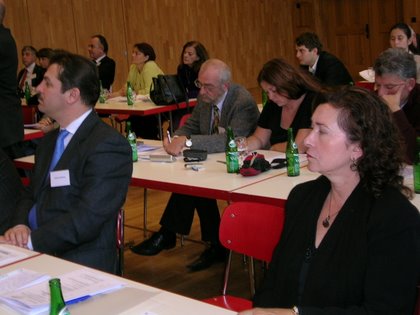
That increases the chances of a financial support of international institutions like EU and private sponsors and could be a special importance in view of the start of the detailed work in the different fields in the region in the next years.






